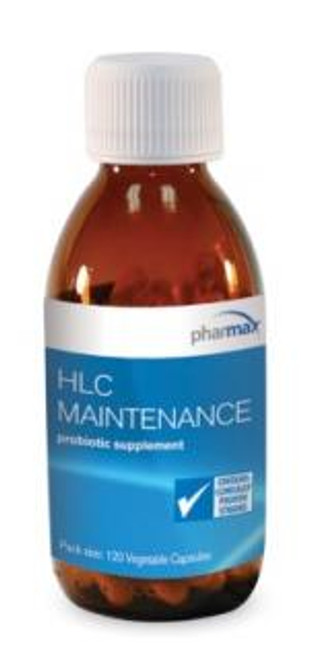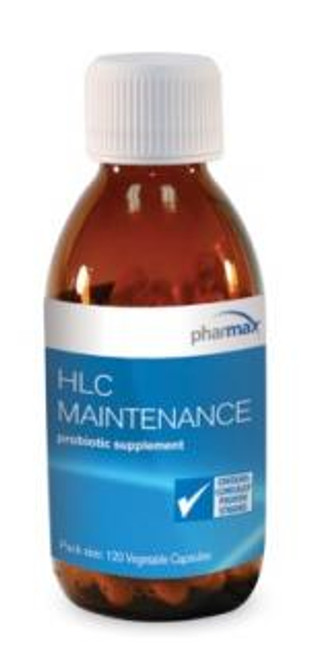Product Overview
Pharmax HLC Child- 30 Tablets
• Probiotic formula for children
• Provides 4 billion CFU per dose
• Great taste
• Natural blackcurrant flavor increases compliance
• Ideal for vegans
• Convenient chewable tablet format
HLC Child probiotic formula is a low level probiotic combination providing Lactobacillus acidophilus, Bifidobacterium bifidum, Lactobacillus paracasei, Lactobacillus salivarius and Bifidobacterium animalis subsp. lactis, essential to the
maintenance of the child’s healthy gut flora.
Additional product info:
Nowadays, the increased use of anti-microbial medication, the consumption of sterile food and reduced family size that result in lower rates of infection during childhood also reduce early contact to microbes. The present increase in allergic diseases seen in the industrialized countries has been attributed, among several other phenomena, to a relative lack of microbial stimulation of the infantile gut immune system and the exaggerated hygiene of the typical western lifestyle during early childhood (2). Probiotics and prebiotics, alone or together (synbiotics), can influence the intestinal microbiota and modulate the immune response (3). Moreover, probiotics increase anti-inflammatory cytokines and gut impermeability to bacteria and toxins, and suppress pathogens (4). Most success has been obtained in primary prevention of atopic eczema. A limited number of studies also provided evidence for a beneficial effect of Bifidobacterium bifidum BGN4, B. lactis AD011, and Lactobacillus acidophilus AD031 in the management of allergic diseases (atopic eczema, allergic rhinitis) (2),(5).
T cell priming, as determined by allergen-induced proliferative responses, is believed to occur principally in early childhood in both atopic and non-atopic infants under the influence of multiple factors including environmental allergen exposure. It is considered that T cell priming with expansion of Th2 cells is a crucial factor in the development of atopic disease (11). Well-designed double-blind placebo-controlled human studies showed that Lactobacillus paracasei sp. paracasei strain F19 administered during perinatal period prevented the occurrence of AD but could not consistently show a reduction in specific or nonspecific IgE or a change in specific immunomodulatory cytokines while higher Th1/Th2 ratios probiotics compared with the placebo groups suggest enhancing effects of some probiotic strains on the T cell-mediated immune response (5),(12).
HLC Child is a low level, long-term probiotics maintenance formula. Bifidobacterium bifidum and Lactobacillus lactis are found more commonly in the composition of the intestinal flora of non-allergic children(2),(6). In addition, HMF Probiotics has been shown in human double-blind, placebo-controlled clinical studies, at a core consortium of 25 billion CFU, to:
• Reduce the risk of Clostridium difficile diarrhea in hospitalized patients (1).
Moreover, daily administration of Lactobacillus salivarius CECT5713 to healthy adults has shown to improve gut microbiota and different parameters related to immune response (9).
References:
1. Plummer, S., Weaver, M.A., Harris, J.C., Dee, P. and Hunter, J. “ Clostridium difficile pilot study: effects of probiotics supplementation on the incidence of C.difficile diarrhea.” International Microbiology. 2004; 7(1):59-62.
2. Ozdemir O. Various effects of different probiotic strains in allergic disorders: an update from laboratory and clinical data. Clin Exp Immunol. 2010 Jun;160(3):295-304.
3. Gourbeyre P, Denery S, Bodinier M. Probiotics, prebiotics, and synbiotics: impact on the gut immune system and allergic reactions. J Leukoc Biol. 2011 May;89(5):685-95.
4. Tarnow-Mordi WO, Wilkinson D, Trivedi A, Brok J. Probiotics reduce all-cause mortality and necrotizing enterocolitis: it is time to change practice. Pediatrics. 2010 May;125(5):1068-70.
5. Kim JY, Kwon JH, Ahn SH, Lee SI, Han YS, Choi YO, Lee SY, Ahn KM, Ji GE. Effect of probiotic mix (Bifidobacterium bifidum, Bifidobacterium lactis, Lactobacillus acidophilus) in the primary prevention of eczema: a double-blind, randomized, placebo-controlled trial. Pediatr Allergy Immunol. 2010 Mar;21(2 Pt 2):e386-93.
6. Prakash S, Rodes L, Coussa-Charley M, Tomaro-Duchesneau C. Gut microbiota: next frontier in understanding human health and development of biotherapeutics. Biologics. 2011;5:71-86.
7. Plummer SF, Garaiova I, Sarvotharn T, Cottrell SL, LeScouiller S, Weaver MA et al. Effects of probiotics on the composition of the intestitinal microbiota following antibiotic therapy. Int J Antimicrob Agents. 2005; 26(1):69-74.
8. Madden JA, Plummer SF, Tang J, Garaiova I, Plummer NT, Herbison T, et al. Effects of probiotics on preventing disruption of the intestinal microflora following antibiotic therapy: a double-blind, placebo-controlled pilot study. Int Immunopharmacol. 2005; (6): 1091-7.
9. Sierra S, Lara-Villoslada F, Sempere L, Olivares M, Boza J, Xaus J. Intestinal and immunological effects of daily oral administration of Lactobacillus salivarius CECT5713 to healthy adults. Anaerobe. 2010 Jun;16(3):195-200.
10. Allen SJ, Jordan S, Storey M, Thornton CA, Gravenor M, Garaiova I, Plummer SF, Wang D, Morgan G. Dietary supplementation with lactobacilli and bifidobacteria is well tolerated and not associated with adverse events during late pregnancy and early infancy. J Nutr. 2010 Mar;140(3):483-8.
11. Smart JM, Suphioglu C, Kemp AS. Age-related T cell responses to allergens in childhood. Clin Exp Allergy. 2003 Mar;33(3):317-24.
12. West CE, Hammarström ML, Hernell O. Probiotics during weaning reduce the incidence of eczema. Pediatr Allergy Immunol. 2009 Aug;20(5):430-7.
Other ingredients: Sorbitol, xylitol, natural blackcurrant flavor, silica, magnesium stearate








